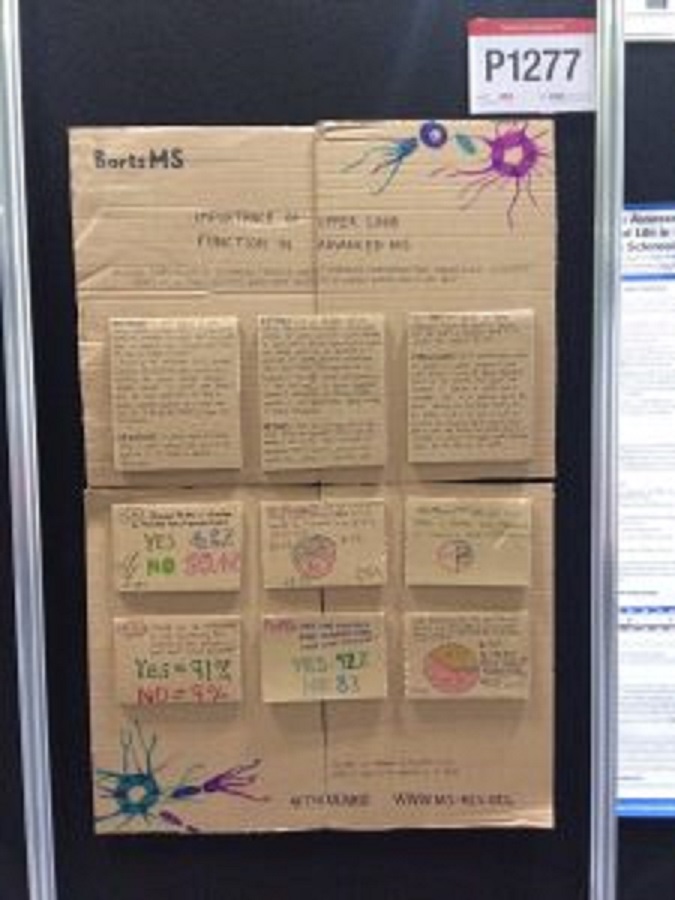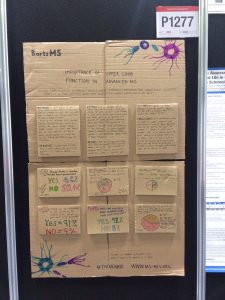Thinking, Hands, and MS!
Written by |


ECTRIMS 2016 (European Committee for Treatment and Research in MS) produced lots of stories with exciting headlines about advances in MS research — and hopefully you read many of them here at MS News Today. As I went through the various presentation titles, there were a couple that jumped out at me, made me pause, and even made me smile a bit. They both involved a combination of thinking, hands, and MS.
First was a study that challenges the EDSS (Expanded Disability Severity Scale) as the gold standard for measuring the success of a drug undergoing a trial.
From the abstract titled “Multiple sclerosis, EDSS, and objective cognitive function: a walking scale with no apparent brains and limited thought,” the authors note: “EDSS is universally accepted to measure treatment efficacy but cognitive function does not impact EDSS. Cognitive function varies independently of walking ability and is an important aspect of PwMS (people with MS) disease impact.”
From their study of 258 people with MS they came to the conclusion: “EDSS is insensitive to assess individual PwMS cognitive ability and does not predict accumulated cognitive disability. Cognitive impairment in PwMS, independently of EDSS, correlates with many important milestones. EDSS use as a solitary gold standard in measuring unique accumulated PwMS disability should be reconsidered.”
The authors appear to present the finding that there should be more to look at for outcomes in people involved in a clinical trial than just how fast they can walk, or whether they need an assistive device (cane, walker, wheelchair) to safely move around. I look forward to reading more on the study when results become available, but for now I can only see the abstract under a provocative title.
Second, the idea that there should be other trial measurements in addition to whether we can walk, was also a larger part of ECTRIMS, as one of their “burning debate” conversations.
In fact, #ThinkHand was introduced by the group from Neuroimmunology, Blizard Institute, Barts and The London School of Medicine and Dentistry — and they carried on this conversation throughout ECTRIMS 2016.
Their argument shared the view that even though people may be in wheelchairs, they should still be part of trials for progressive MS treatments because upper limb function and cognitive function are more important to most people with MS than their ability to walk. I believe we should include hand function as part of study outcomes, but presently that is not the case because almost all trials have improvement in the EDSS as one of their endpoints.
Unusual handwritten poster about thinking, hands
 This group is so committed to the idea of #ThinkHand (their Twitter hash tag) that they have developed their own 9-hole peg test that can be made from cardboard and used at home by people with MS to monitor their own hand function. They also did something out of the ordinary for their poster presentation at ECTRIMS — they presented their #ThinkHand argument on a hand written poster, something akin to what you or I did in a middle school science fair. From what they wrote in their blog, their #ThinkHand poster made people really stop and read their information.
This group is so committed to the idea of #ThinkHand (their Twitter hash tag) that they have developed their own 9-hole peg test that can be made from cardboard and used at home by people with MS to monitor their own hand function. They also did something out of the ordinary for their poster presentation at ECTRIMS — they presented their #ThinkHand argument on a hand written poster, something akin to what you or I did in a middle school science fair. From what they wrote in their blog, their #ThinkHand poster made people really stop and read their information.
You can read more about #ThinkHand and the issues of having all people with MS represented in clinical trials. Let us know what you think. Should hand function be another measurement for clinical trials for progressive MS?
Both of these items from ECTRIMS 2016 tell me that a) researchers recognize there is much more to our quality of life than the ability to walk, and b) they are willing to engage in thinking differently.



Judy Lynn
Brilliant- both of them! I look forward to reading more, but I absolutely agree that EDSS provides limited information and clinical trials should consider much more. I would also vote for quality of life measures to be included.